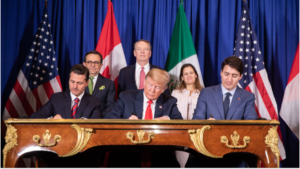16-year-old Noah Saphier outlines the key elements of the new president’s economic policy

President Donald Trump signs executive orders.
Picture by: The White House | Flickr
Article link copied.
January 31, 2025
Trump 2.0: How will you be affected by Trumponomics?
Economic concerns have long been at the forefront of American politics, and many attribute Donald Trump’s victory to his focus on this pressing issue. In fact, eight in ten registered voters cited the economy as a decisive factor in their vote.
During his campaign, Trump claimed he would revitalise the US economy, pointing to lower prices of goods during his previous presidency as evidence. As a result, many Americans voted for him in hopes of solving their financial struggles. What policies did they endorse? How effective will “Trumponomics” be?
Agenda 47 is the Republican party’s manifesto for Trump’s presidency, outlining some major policies including education, immigration and healthcare reforms. In terms of the economy, Trump claims that he will cut taxes, diminish federal regulations and impose tariffs on trade partners.
On his first day in office, Monday 20 January, Trump revoked 78 executive orders that were put into place by President Biden. But, notably, he did not impose any tariffs, although he says he will put a 25% tariff on products from Canada and Mexico, and an additional 10% tariff on products from China, all on 1 February.
Harbingers’ Weekly Brief
Stock market predictions
Experts foresee that under the Trump administration, the stock market will thrive, driven by tax cuts and deregulation that he is promising. This means that those who have the resources to invest will benefit from his pro-market policies.
“Trump is the most pro-stock market president we have had in our history,” Jeremy Siegel, finance professor at the University of Pennsylvania’s Wharton School, stated. In fact, since Donald Trump’s election victory, the S&P 500 Index has soared. In terms of a Trump administration, “markets are basically thinking it’s pro-growth, even if it comes with higher inflation and higher interest rates,” said David Bianco, Americas chief investment officer at DWS Group.
According to some commentators, three S&P 500 stocks are predicted to surge: Tesla, the technological innovation company owned by Trump’s close ally Elon Musk; Tractor Supply, a national supplier of farming equipment expected to benefit from the rise in import prices; and Berkshire Hathaway, an investment company likely to gain from Trump’s pro-infrastructure and pro-oil rhetoric. All are anticipated to thrive under the new administration.
On Tuesday, the day after the inauguration, the price of Bitcoin rose by 4.67%. Trump and his wife Melania have also launched their own cryptocurrencies ($TRUMP and $MELANIA), causing critics to claim that he is trying to financially capitalise on his presidency, by releasing cryptocurrencies and simultaneously being a great supporter of crypto.
For lower- and middle-class Americans who don’t have financial security, a thriving stock market may not help them at all. Instead, it acts as an economic mirage, hiding the reality of the pockets of a large number of Americans. Average families won’t see a difference in their everyday lives.
Taxes and tariffs
Trump’s widely advocated “America First” trade policy is designed to stimulate the US domestic economy and create more manufacturing jobs within the US – but it could take years of investment to see some results.
In November, Donald Trump announced his intentions to add 25% tariffs on Mexico and Canada and increase Chinese tariffs by 10%. These are meant to kick in on 1 February. With these countries contributing up to 40% of US international trade, questions rise about the consequences of these tariffs.
First, what are tariffs and how do they work? Simply put, tariffs are taxes on imported goods. These extra taxes will lead to higher prices, allowing domestic goods, which are usually more expensive, to thrive. While they may boost domestic businesses, tariffs will not combat inflation because of the added tax that consumers will need to pay.
Some countries increase tariffs to incentivise other countries to lower their own. Or to persuade other governments to take action on particular policies. Many ask, if Canada and Mexico are the US’s most valuable trading partners, why would Trump want to impose tariffs on them? He may use them as a way to combat political issues such as border security.
Commitments in the United States-Mexico-Canada Agreement (USMCA), a trade agreement introduced in 2020, may be violated by these tariffs.
Canada’s prime minister Justin Trudeau has already said he would impose tariffs on the US in a “dollar-for-dollar” response. The Mexican president Claudia Sheinbaum said that she will also retaliate by imposing tariffs on US goods. She declared: “We coordinate, we collaborate, but we will never become subordinated.”
Trump’s plans are no surprise; in his first term he engaged in a trade war with China, another key trading partner, imposing tariffs on about $300bn of Chinese-made products. Biden has kept and increased Trump’s tariffs on electric vehicles (EVs) and solar panels, anticipating future tariffs on technological devices and semiconductors.

Left to right: Mexican president Enrique Peña Nieto, US president Donald Trump and Canadian president Justin Trudeau sign the USMCA agreement, Argentina, November 2018.
Picture by: Trump White House Archived | Flickr
Reality check
In summary, tariffs could stimulate long-term domestic production and raise money for the government, but increase inflation on consumer goods. Notably, in line with his deregulation tendencies, Trump has already reversed Biden’s efforts to lower the cost of prescription drugs for people on Medicare and Medicaid.
So, if you are planning to invest in the stock market or are a business owner who has competitors in China, Mexico or Canada, Trump’s policies may appeal to you. However, Trump has promised to advocate for the “common American worker” – but actions and results speak louder than words. His proposals do not really fit the narrative that won him the presidency.
In the long term, it is true that more job opportunities should be available in the US. One example is in technological fields, such as the US semiconductor industry that is projected to grow in the next few years due to tariffs on China and Biden’s secured commitments with Chinese chipmakers to build factories in the US.
People should not expect new jobs to be created the second Trump is in office; domestic industries take time to develop.
Trump claims that by deregulating energy, even saying “drill baby drill” in his inaugural address, US farmers will be able to produce more food, thereby lowering prices. However, the fact is that 55% of fresh fruit and 32% of fresh vegetables in the US comes from abroad. Will an increase in US productivity and industry be enough to lower prices even after the increase in tariffs? Many think it’s more likely that the introduction of tariffs will increase food prices.
Trump’s policy proposals highlight an underlying tension between short-term strain and long-term economic ambition. While many believe his promises to uplift the working class won him the election, the reality is that his plans may widen the gap between Americans who thrive from market growth and those who struggle from rising costs of living. Whether his administration can successfully bridge this divide remains unclear.
The reality is that at his inauguration, well-known tech billionaires, including Elon Musk, Mark Zuckerberg, Jeff Bezos and Sundar Pichai, all sat in front of Trump’s cabinet picks and his family. Which makes you wonder, who will really benefit from Trumponomics?
Written by:

Editor-in-Chief 2025
New Jersey, United States of America
Born in 2007 in New Jersey, Noah Aaron Brühl Saphier studies in Englewood New Jersey, United States of America. He is interested in journalism, economics, science, sports, and history.
Noah joined Harbingers’ Magazine in the summer of 2023. A few months later, he became a writer covering economics, business, and politics. After almost two years of dedication and hard work, he was promoted to Editor-in-chief of the magazine. In March 2025, he took the helm from Jefferson He, who stepped down after completing his one-year term.
In his free time, Noah plays tennis and the violin, learns about exploration in the ocean and space, and travels.
Noah speaks English, Spanish, and German.
Edited by:

🌍 Join the World's Youngest Newsroom—Create a Free Account
Sign up to save your favourite articles, get personalised recommendations, and stay informed about stories that Gen Z worldwide actually care about. Plus, subscribe to our newsletter for the latest stories delivered straight to your inbox. 📲
© 2025 The Oxford School for the Future of Journalism


